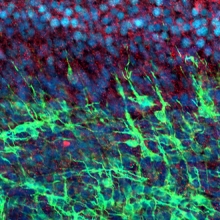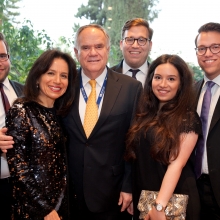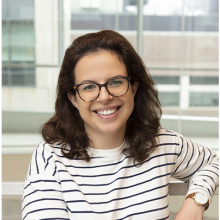Making immunotherapy more effective
New scientists

Cancer immunotherapy has come of age. The idea of harnessing the immune system to fight cancer has already moved from the lab to the clinic, thanks to new technologies that make it possible to generate synthetic antibodies capable of controlling the strength and duration of the immune response.
But cancer immunotherapy isn’t for all patients: only a minority of patients, suffering from specific cancer types, respond positively to this type of treatment.
Dr. Rony Dahan arrives on campus with a significant achievement; working together with his postdoctoral advisor at Rockefeller University, he created a cancer immunotherapy drug that is 30 times more effective than existing compounds in targeting CD40, a protein involved in immune activation.
The design of the new drug was made possible by a new mouse model that Dr. Dahan developed in his postdoc lab. Engineered to express the same version of the CD40 protein seen in human patients, these mice were also customized to carry humanized Fc receptors, a group of proteins responsible for antibodies’ interaction with immune cells.
Molecular structure plays a critical part in the Fc-antibody relationship. Antibodies are shaped like a Y, consisting of a trunk and two arms extending out at an angle. While most immunotherapy research has focused on how antibodies’ arms “reach out” and bind to immune checkpoint proteins, Dr. Dahan decided to focus on the “back end,” and to examine how the antibodies’ trunk interacts with Fc receptors.
He and his colleagues initiated cancer immunotherapy using existing drugs that target the immune activation protein CD40 in mouse models. They also analyzed which type of Fc receptors were most helpful in stimulating this immune response. “We discovered that, because the existing drugs were not designed to target Fc receptors, they elicited only moderate clinical activity,” he says. “So we engineered a second generation drug that targeted certain Fc receptors and optimized their positive effect. The results were so clear, and so encouraging, that our drug has already been prepared for clinical investigation.” He plans to initiate Phase I clinical trials soon.
Dr. Dahan has used this same approach to examine several of today’s most promising cancer immunotherapy drugs, revealing unexpected Fc-antibody interactions that could be used to create more effective drugs in the future. In his current research, he is working on what he calls the “Fc fingerprint”.
“I plan to continue to examine the Fc fingerprint in the context of cancer in order to better understand how the immune system targets tumors, and to improve cancer immunotherapy.”
Born in Rehovot, Dr. Dahan traces his interest in immunology back to his childhood on the Weizmann campus.
Dr. Rony Dahan was born in Rehovot and completed his BSc in molecular biology (2004) and his PhD in molecular immunology (2009) at the Technion-Israel Institute of Technology. In 2004–2005, he worked as a research scholar at the Multiple Sclerosis Center of Oregon Health and Science University in Portland, and, in 2009, returned there as a Fulbright Foundation Doctoral Fellow. He did postdoctoral research in cancer immunology at the Leonard Wagner Laboratory of Molecular Genetics and Immunology at New York’s Rockefeller University.
Dr. Dahan has been awarded three U.S. patents for antibodies and autoantigenic peptides, and has two patents pending. His prizes include the Technion’s Presidential Excellency Award (2004), the Pollack Prize for Academic Excellence (2007), and in 2010, the Sigma Prize for Outstanding Research awarded by the Israel Immunological Society. In 2011, he was awarded the Sanford Kaplan Prize for Creative Management in 21st Century High Technology, the Immune Therapies Training Award of the Juvenile Diabetes Research Foundation, and a Hershel Rich Technion Innovation Award. In 2014, Dr. Dahan was awarded a Cancer Research Institute Irvington Postdoctoral Fellowship.
Dr. Dahan is married and he and his wife have three children.
He is supported by The Benoziyo Fund for the Advancement of Science, The Pearl Welinsky Merlo Foundation, and the Rising Tide Foundation. Dr. Dahan is the incumbent of the Rina Gudinski Career Development Chair.








